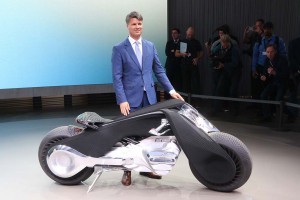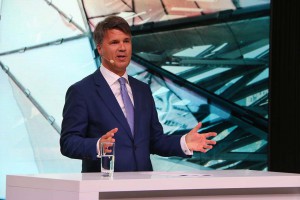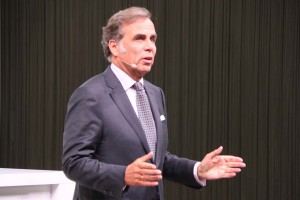
BMW CEO Harald Krueger laid out some of the maker's plans for the future, and showed off the Vision Next 100 motorcycle.
When you’re celebrating your centennial you have good reason to throw a nearly year-long birthday party. But as BMW wraps up the multicity extravaganza that began at its corporate headquarters last March, the focus is on the future, rather than the past.
And that’s likely to bring some dramatic changes for both BMW and the auto industry as a whole, said CEO Harald Krueger, during a media roundtable in Los Angeles. New technology, new regulations and new competitors will change the way cars are designed, manufactured, sold and operated, said the executive as he outlined some of BMW’s near and longer-term strategies.
“A new era of mobility is about to begin,” Krueger said Thursday, as he introduced the BMW Vision Next 100 motorcycle, one of four concept vehicles the carmaker has introduced this year each meant to highlight elements of BMW’s plans.
The sleek, carbon-fiber two-wheeler featured a unique, “bionic” frame that can bend to improve steering, a gyro-stabilization system that keeps the bike standing upright on its own even when stopped, and augmented reality goggles that replace traditional dials and displays.

Krueger highlighted several new products he expected to hit the roads in the future, including a convertible i8.
The other three concepts include:
- A midsize BMW sedan that could eventually replace the familiar 3- or 5-Series models. Made of ultra-light materials, it features a flexible body to enhance aerodynamics, a zero-emissions powertrain and an augmented reality windscreen that, like the bike’s goggles, replaces traditional gauges and switches;
- An all-electric Mini concept that reclaims the space normally occupied by the engine to deliver a nearly full-size interior. The steering wheel can slide left or right, depending upon who’s driving, if anyone is driving at all. The Mini concept also makes use of augmented display technology;
- As does the Rolls-Royce Vision Next 100 concept. Despite mounting its batteries and key powertrain components below the floorboard, however, it features a massive hood that retains the classic presence of an ultra-luxury sedan. A clamshell roof yawns wide so passengers can climb into the living room-like cabin of this driverless vehicle.
The Vision vehicles each target distinct market segments, but they share key elements like their zero-emissions drivetrains and augmented reality displays. Expect to see these technologies work their way into more and more BMW, Mini and Rolls-Royce products in the years ahead, Kruger explained during his media roundtable.
(BMW rides into future with Vision Next 100 motorcycle. Click Herefor the story.)

Ludwig Willisch, BMW's U.S. CEO, said he expects vehicle- and ride-sharing will have little impact on vehicle sales.
Earlier this decade, the Bavarian automaker launched a unique sub-brand, dubbed BMW i, to market electrified vehicles. Currently, those include the electric i3 city car and the plug-in hybrid i8. But two more models are coming, Kruger said, a roadster version of the i8 due in 2018, and a more radical battery-electric vehicle, the iNext, about three years later.
Right now, Krueger noted, alternative powertrains are largely being driven by regulatory demands, but consumers are beginning to turn on to the technology as costs drop, range improves and it becomes easier to charge the vehicles up. Asked if new battery-cars delivering at least 200 miles per charge – like the Chevrolet Bolt and Tesla Model 3 – will move the technology into the mainstream, Krueger answered, “absolutely.”
The advent of the zero-emissions vehicle is one of four key changes Krueger said BMW is focusing on. And along with battery drivelines, he said BMW remains committed to hydrogen power, as well. The German maker has an ongoing partnership with Toyota and some of their joint efforts will be put on display during the next Olympics.
“Tokyo 2020,” said Krueger, “will be a big statement for fuel cells.”
Connectivity is another key transformation in progress. BMW is committed to making it possible to seamless stay connected no matter what device you’re using, the CEO said. Connected vehicles also will be critical to bringing autonomous vehicles to market. BMW currently aims to have its first self-driving model in production by 2021.
(Codenamed 103EX, this is definitely not your (rich) father’s Rolls-Royce. Click Here to check it out.)
But Krueger stressed that the maker remains committed to giving drivers the choice of switching that technology on and off. Others can go completely driverless, he said, adding that the brand will remain “the ultimate driving machine.”
“If a customer just needs to go from Point A to Point B, they don’t need a BMW,” said Krueger, “I am selling emotions, passion.”
The fourth trend reshaping the industry will bring more and more vehicle- and ride-sharing, Krueger said. Like key competitors, including Mercedes-Benz, Volkswagen and General Motors, the Bavarian automaker has launched a number of pilot programs, some using the Mini-e electric vehicle.
Some observers have predicted that the growth of vehicle sharing will consequently lead to a decline in vehicle sales. But that’s not likely, insisted Ludwig Willisch, BMW’s U.S. CEO, who joined global chief Krueger for the roundtable.
The average private vehicle is on the road an hour a day. A shared vehicle for a service like Uber might always be on the go, Willisch explained, “therefore its lifetime will be shorter,” meaning more frequent trade-ins.
At least, that’s the scenario BMW executives are betting on. But as the maker learned during its first century, the future can be difficult to predict. And there are not only the old competitors but a number of new ones entering the market, such as Tesla and Faraday Future.
(BMW planning to launch autonomous car by 2021. Click Here for more.)
“We welcome all new competitors,” Krueger insisted, adding that whatever the future brings, BMW intends to “remain on top.”
